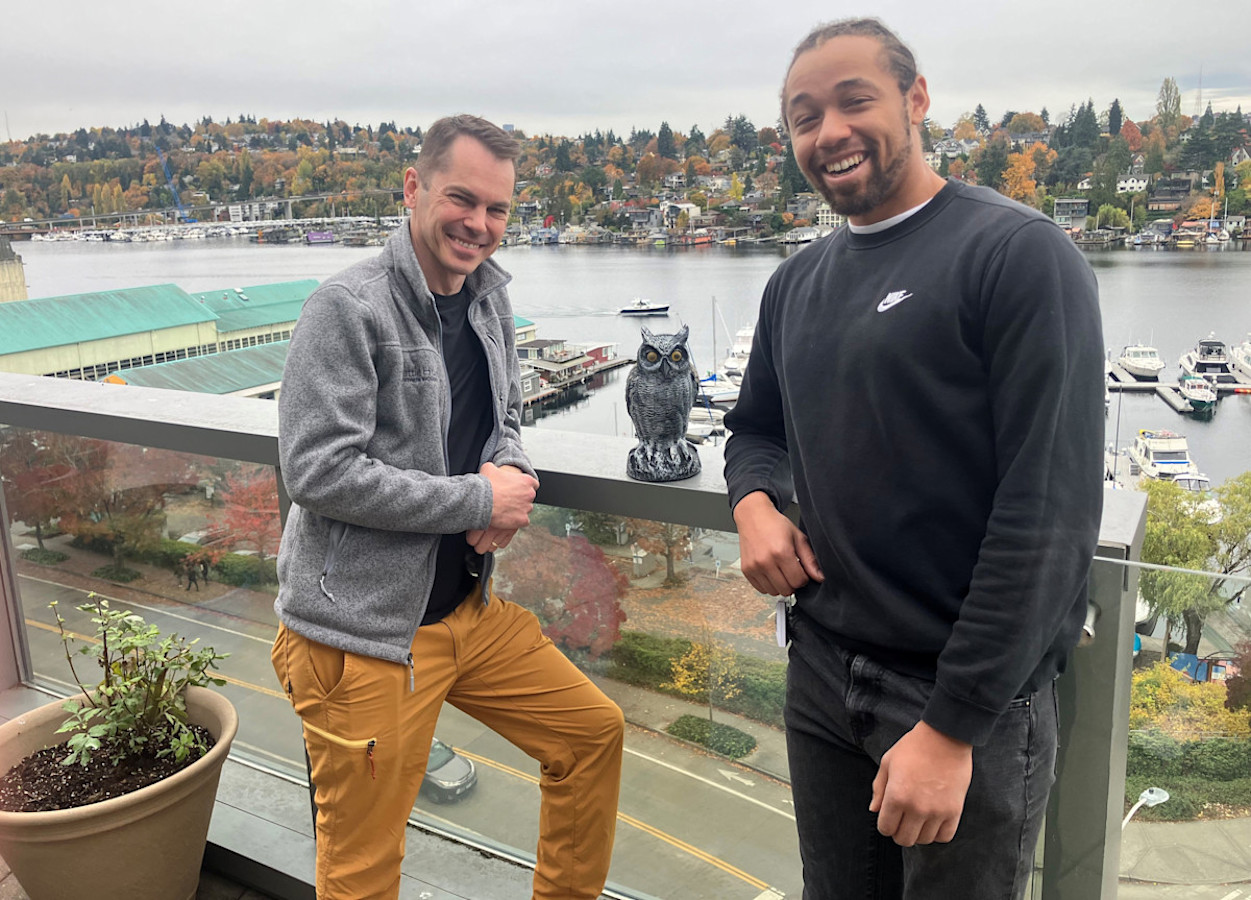 Marazzano Colón, right, and Cole Trapnell, Ph.D.: 'When I failed my first calculus test, I panicked. I questioned whether I belonged.'
Marazzano Colón, right, and Cole Trapnell, Ph.D.: 'When I failed my first calculus test, I panicked. I questioned whether I belonged.'
Marazzano Colón admits he has taken an “interdisciplinary path” to become a computational biologist in the lab of BBI's Cole Trapnell, Ph.D. It’s been more of “journey of discovery,” exploring plant sciences, mathematics, and economics, among other disciplines.
It is evident, though, that math has been – and will be – foundational in Colón’s career.
“Mathematics is a dance between logic and creativity,” he said. “It reveals the patterns and structures underlying the fabric of reality.”
The first threads of that fabric were discovered not in a lab or classroom, but in the backseat of his mother’s car when Colón was learning to read. There, he found children’s books on topics including, how the solar system was formed and how plants turn sunlight into energy.
“Her belief in education gave me my earliest exposure to science,” said Colón, 26. ’It was through moments like these that she nurtured my curiosity. I became drawn to science, discovering how fascinating our universe is to live in and to learn about. This passion for understanding the world now drives both my personal life and scientific career.”
His “understanding of the world” advanced significantly when, in high school, he joined the Kappa Leadership Institute of Chicago, an organization associated with the Kappa Alpha Psi fraternity. The program provides college preparatory skills for underrepresented minority males.
“As an African American male, I gained access to opportunities through the Kappa League that would have otherwise been difficult to find, such as SAT prep, college essay assistance, college tours, and volunteer programs,” Colón said. “Through the Kappa League, I discovered Duke University's academic strengths, realizing it was a premier research institution, not just the home of a great college basketball team.”
Although Colón did not play hoops for the Blue Devils, he took advantage of Duke’s plethora of opportunities for undergraduates, including studying abroad in Oxford and Madrid, as well as a summer internship in plant biology at Cornell University.
But by no means did he coast through the university’s STEM-related curriculum.
“Upon arriving at Duke, I gradually realized the stark differences between my peers and me in how prepared we were for success in the field,” Colón said. “When I failed my first calculus test, I panicked. I questioned whether I belonged. In many of my classes, I didn't see anyone who looked like me.”
He finally recognized his challenges in STEM courses when he took proof-based linear algebra, his fourth math course.
“I struggled to even pass this class, despite studying so hard that I began to see proofs in my dreams,” he said. “During the lecture, I overheard a first-year student mention that linear algebra was his first math class and that he had already taken it at his prep school in New York. I didn’t even know linear algebra existed when I was in high school.”
Regardless, Colón did not enable past disparities between himself and his peers engulf his determination.
“Instead, I focused on the positives, and recognized how privileged I was to study math at a high level,” he said. “This realization led me to become a TA for calculus classes as a sophomore. I wore my passion for math on my sleeve, tailoring my explanations to help students feel more confident.”
After graduating in 2021 with Bachelor of Science degrees in Mathematics and Economics, Colón served for as a Research Technician in the lab of Li Qian, Ph.D., a Professor and Associate Director of the McAllister Heart Institute and UNC Chapel Hill. There, he advanced his knowledge in biology “through the lens of direct reprogramming and analyzing single cell datasets.”
A year later, Colón began applying to several graduate schools, including the University of Washington. He was familiar with the work of two faculty: Trapnell, his current Principal Investigator in the Department of Genome Sciences, and David Baker, Ph.D., Director of the Institute for Protein Design (IPD).
After visiting the campus, his sights were set.
“I saw the culture, the collaboration, and the general positivity of Genome Sciences,” he said. “And, of course, the beauty of the Pacific Northwest.”
Colón arrived at the UW in 2023 and spent a year in IPD where his work focused on whether a computationally designed protein would fold, based on its amino acid sequence.
“While the project was successful, and I designed a neural network that saved time and resources by prioritizing proteins likely to fold correctly in vivo, I spent much of my time trying complex neural network architectures that didn’t outperform simpler ones,” he said. “In fact, the simplest neural network barely outperformed linear regression. This experience taught me that deep learning, while powerful, is not always the best approach.
“Moving forward, I now prioritize models that balance complexity and ‘explainability,’ that is, the ability of AI systems to provide clear and understandable reasons for their decisions or actions to humans. This ensures they perform well and offer clear, actionable biological insights.”
Seeking “actionable biological insights” has taken on a new level of importance for Colón with his work in the Trapnell Lab and specifically with the Seattle Hub for Synthetic Biology.
“One of Seattle Hub’s missions is to move biology in the direction of big data,” he said. “We are sequencing whole embryos and exploring the question, ‘How consistent are these embryos? If they look the same, do they have the same gene expression?’ We are incorporating high throughout imaging and, to help complement that analysis, we are squeezing more out of the data.
“I have always been a curious person. I like to consume knowledge.”


